#Reactive Power Support
Explore tagged Tumblr posts
Text
From Reactive to Reflective: Unlocking Mind Over Mood Strategies
#cognitive triangle#connection#emotional health#emotional state#environment#mind over mood#power of thought#reactive to reflective#strategies#support#thought
0 notes
Text
What Is “Soft Domming” and How to Do It?
╰┈➤ A Detailed Guide
Soft domming is a style of dominance rooted in care, emotional attunement, and subtle power dynamics. It emphasizes psychological control, gentle authority, and nurturing dominance over overt force or aggression. Unlike hard or sadistic domination, which can involve intense power exchanges and pain, soft domming is more about leading with tenderness, calm confidence, and emotional intelligence.
This article explores what soft domming is, the principles behind it, and how to practice it effectively and ethically—whether you’re new to BDSM or an experienced player expanding your dynamic range.

This article includes:
What Is Soft Domming?
Soft Domming vs. Hard Domming
How to Practice Soft Domming
Common Types of Soft Dom Scenes
Soft Dom Archetypes and Roleplay
Soft Domming in Long-Term Dynamics
Communication Tools for Soft Domming
Tools and Props That Support Soft Domming
Soft Domming and Submissive Archetypes
Integrating Soft Domming into Vanilla Life
Emotional Risks and Boundaries
Is Soft Domming Right for You?
Final Thoughts

1. What Is Soft Domming?
Soft domming refers to a style of dominance where the dominant partner maintains control in a scene or relationship, but does so in a gentle, emotionally supportive, and often affectionate way. It’s not about being passive—it’s about being in charge without needing to raise your voice or break someone down. Soft domming combines intention with emotional presence.
Key Traits of a Soft Dom:
• Calm, steady authority: The soft dom isn’t reactive or loud. They exude grounded confidence that makes the submissive feel secure and guided. This can include measured pacing in speech, calm handling of unexpected emotions, and an unwavering sense of “I’ve got you.”
• Empathy and emotional awareness: A soft dom pays close attention to how their partner is feeling moment to moment. They notice the smallest changes in body language, tone, and energy. They prioritize emotional feedback over technical performance.
• Nurturing and validating behavior: Affirmation and support are tools of control. A soft dom leads through encouragement, not criticism. This is especially important for submissives who are sensitive, new, or healing from past trauma.
• Non-verbal control (eye contact, tone, body language): A raised eyebrow, a soft touch, a pause before a sentence—these tools become power moves in soft domming. Eye contact alone can keep a submissive grounded and obedient.
• Affectionate language, even when giving commands: A soft dom uses language that is warm, inviting, and laced with care. This could mean giving orders in a whisper, with a smile, or framed as a favor being done out of love.
Soft doms often engage in aftercare-focused dynamics, emphasize verbal praise over degradation, and create a safe space where their submissive feels protected, seen, and guided. That doesn’t mean it lacks intensity—it just manifests differently, often in a quieter, more psychological way. In many cases, soft domming can evoke even deeper emotional surrender because it builds on safety and trust, not intimidation.

2.

Both are valid expressions of dominance. Some people blend elements of both. The important thing is consent, communication, and knowing what works for you and your partner(s). A soft dom might still use physical tools or protocols—but the intention behind them is different. Where a hard dom says “Obey me or suffer,” a soft dom says, “Obey me because you trust me—and you want to.”

3. How to Practice Soft Domming
1. Understand the Power You’re Holding
Soft domming is not passive. You’re still leading. You still set the tone, establish the boundaries, and guide the experience. The difference is how you do it—with softness, consistency, and care.
Start by asking yourself:
What kind of control do I want to offer?
What does my partner need to feel safe and submissive?
How can I create a space where they can let go?
A soft dom does not seek control for its own sake—they offer it as a structure for the submissive’s self-expression. That’s a core difference: a soft dom views control as a gift given to the submissive, not a right seized from them. This mindset frames the entire dynamic in a more relational, cooperative light.
The role of a soft dom often resembles a caretaker, mentor, or protective lover—someone who holds space for their submissive’s surrender without violating trust. Many soft doms take on a teaching role, especially in newer dynamics, patiently showing their partner how to give up control safely and enjoyably.
2. Set the Scene with Intention
Environment matters. Create a mood that invites trust and openness. This might involve dim lighting, soft music, clear communication about roles, and rituals that reinforce your connection (like kneeling, collaring, or phrases of affirmation).
Soft domming scenes benefit from clear beginnings and endings. This helps define the emotional arc and signals when to “drop in” and when to return to everyday roles. The more intentional the scene, the more your partner can relax into it.
Examples:
“Look at me while you breathe, just like that.”
“Good. You’re doing exactly what I need.”
“Let me take care of you tonight.”
These affirming statements are commands in disguise—gentle but directive. They keep the submissive grounded in the moment while reminding them who is in charge.
Rituals are especially useful in soft domming. Even small routines (like having your submissive wait quietly while you prepare a scene, or removing their jewelry as a sign of control) build a framework of consistent dominance without harshness. A nightly “yes, Sir” check-in or a morning collaring ritual can reinforce emotional connection and power dynamics outside of physical play.
3. Use Praise and Psychological Play
Soft doms often lean heavily on praise kinks and psychological dominance. Instead of breaking someone down, you build them up—controlling them by becoming the voice they want to please.
Phrases that work:
“You’re such a good girl/boy/pet.”
“I love how you give yourself to me.”
“Stay still for me. That’s perfect.”
The goal is to make your partner feel wanted, seen, and owned—without needing to scare or overwhelm them.
Praise is not just about ego-stroking. It becomes a tool of emotional conditioning. You’re shaping their behavior and deepening their trust by giving attention and affection for obedience, vulnerability, or devotion.
Advanced tactic: Mix praise with mild teasing or restraint.
╰┈➤ For example: “You’ve done so well—but not yet. Wait for my word.” (This uses affection to control pacing and anticipation.)
You can also use psychological play with consensual emotional vulnerability:
Ask them to confess a desire.
Encourage them to write or speak affirmations.
Have them journal about their submission, then read it to you.
Control their focus through grounding exercises (“Feel the floor beneath your knees. Good. Now give me your eyes.”)
4. Touch and Nonverbal Control
Soft domming is tactile. It’s about controlling pace, movement, and reactions through gentle touch—stroking hair, steadying hands, guiding with a fingertip. Eye contact, tone, and physical presence often speak louder than words.
Tactics:
Pulling a partner close and whispering a command.
Holding their face gently while giving instructions.
Slowing their breathing with yours.
You don’t need impact tools to dominate someone’s body. You just need presence and clarity. A hand on the back of their neck. A slow inhale followed by, “Now exhale with me.” Touch can be corrective, rewarding, grounding—or all three at once.
Body language should be intentional. Every gesture—where you place your hands, how you touch them, how you lead their body—should reinforce control while offering safety. It’s the dominance of reassurance.
Breath play in a very light and consensual form can even be part of soft domming—not in the sense of cutting air, but of guiding breath to build rhythm and trust: “Breathe with me. Good. Let go now.” You’re not taking their breath—you’re teaching them to feel it more deeply.
5. Be Attentive and Responsive
A good soft dom reads their partner moment to moment. You’re not just doing things to them—you’re doing things with them. Pay attention to body language, breathing, eye movement. Ask questions when needed. Stay attuned.
Soft doms often check in without breaking the scene, using subtle cues:
“Still with me?”
“Do you want more, or should I slow down?”
“Give me a word if you need to pause.”
This maintains safety without disrupting intensity.
Also consider incorporating verbal or visual safewords, especially if your dynamic emphasizes emotion over intensity. For example, “green/yellow/red” traffic light systems work well, or simply: “tap once for yes, twice for no.”
When in doubt, overcommunicate. A soft dom doesn’t guess—they ask. And then they listen.
6. Prioritize Aftercare
Soft dom dynamics often go deep emotionally. That makes aftercare non-negotiable. Whether you were stroking or spanking, your submissive may feel exposed, vulnerable, or overwhelmed.
Offer:
Water, cuddling, affirmations
Gentle grounding touch
Reassurance of safety and value
Time to decompress and talk
The dominant may also need aftercare—don’t neglect your own emotional well-being.
A soft dom might use aftercare to reinforce their presence and ownership: “You’re mine, and I’ll always take care of you.” It’s a continuation of the dynamic, not a break from it.
Consider discussing the scene afterward in a debrief, not as a critique but as a way to reinforce trust: “How did you feel when I said that?” or “Did anything surprise you tonight?”

4. Common Types of Soft Dom Scenes
Soft domming isn’t limited to one kind of dynamic. The emotional range is wide—romantic, parental, mentoring, spiritual, and sensual. Here are some popular soft dom scene types that reflect the variety of dynamics:
1. Guided Submission
The dominant guides the submissive through a series of instructions—simple, slow, and intentional—using voice and presence more than physical restraints. This can be a highly meditative experience.
Elements to include:
Verbal pacing (“Take off your shirt. Slowly. Good.”)
Breath synchronization
Eye contact as a command
Praise for each step
Gentle corrections without shame
This scene is ideal for submissives who enjoy focus, structure, and affirmation more than degradation or discipline.
2. Service-Oriented Domination
Service submission is where a submissive expresses devotion by serving the dominant in practical or ritualistic ways. A soft dom uses tone and structure to reinforce that this service is an act of love and obedience—not obligation.
Examples:
Preparing tea, folding laundry, or assisting with self-care
Ritual grooming (brushing hair, running a bath)
Massage with instructions and affirmations
Following a daily care or task list from the dom
A soft dom might say, “Polish my shoes for me—not because you have to, but because it’s how you show you’re mine.”
3. Emotional Edgeplay
This is the most delicate form of soft domming. The dom gently pushes the submissive to explore emotional vulnerabilities—desires, fears, insecurities—while holding a secure, affirming space.
Examples:
Confessional scenes (asking the sub to speak secrets or confessions while kneeling)
Writing scenes (journaling assignments with deep reflection)
Mirror scenes (having the sub speak self-love affirmations in front of a mirror while guided)
Warning: Emotional edgeplay requires advanced trust and strong communication. Only engage in this with a solid aftercare plan and clear emotional consent.

5. Soft Dom Archetypes and Roleplay
Not all soft doms look or act the same. There are many expressions of gentle dominance. Think in terms of energy and archetype.
Common Soft Dom Archetypes:
Caretaker Dom: Focuses on healing, support, and soothing. May use nurturing tasks like feeding, bathing, and cuddling.
Romantic Dom: Uses poetic, affectionate language. Highly sensual, attentive, and deeply emotionally invested.
Mentor Dom: Offers structure, growth, and wisdom. May help the submissive with personal goals, mindset training, or emotional development.
Elegant Dom: Composed, graceful, and subtle. Dominates through poise, gaze, and precision.
Protective Dom: Soft but firm. Prioritizes safety, security, and acts of shielding. Physically or emotionally stands between the sub and the world.
Roleplay Scenarios That Fit Soft Domming:
Teacher / Student: Encouraging performance, gently correcting mistakes, rewarding obedience.
Royal / Servant: Soft authority, quiet command, focused on protocol and devotion.
Boss / Assistant: Not aggressive—more like calm guidance, mentorship, “I know what’s best for you.”
Healer / Patient: Grounded in body care and surrender. Can involve consensual caretaking in a ritualized way.
Roleplay is a way to express fantasies while reinforcing the tone of the dynamic. For soft domming, roleplay often emphasizes reassurance, personal development, or romantic tension—not humiliation or punishment.

6. Soft Domming in Long-Term Dynamics
While soft domming is often discussed in the context of scenes, many couples build ongoing power exchange relationships based entirely or primarily on this dynamic.
These long-term D/s relationships can include:
Consistent rituals and rules that affirm the power exchange in daily life (e.g., bedtime rituals, meal prep tasks, honorifics like “Sir,” “Ma’am,” or custom titles).
Emotional leadership, where the dominant offers guidance in the submissive’s personal or professional life with care and intentionality.
Long-term service tasks that provide the submissive with a sense of purpose and devotion.
Relationship coaching-style dominance, where the dom helps the sub achieve their goals by using encouragement, structure, and emotional accountability.
In this context, soft domming becomes a blend of dominance, life coaching, and gentle authority. It’s not about micromanaging—it’s about curating a lifestyle of support and erotic control.

7. Communication Tools for Soft Domming
Clear, compassionate communication is a hallmark of soft dominance. Here are some techniques that strengthen emotional safety and deepen connection:
Active Listening
Soft doms listen with their full attention. They mirror their partner’s words, offer empathy, and respond with care—even in disagreement.
Open-Ended Questions
Instead of “Do you like that?” try:
“What are you feeling right now?”
“What does this make you think about?”
“What do you need more of to feel safe?”
Tone Framing
Soft doms pay attention not just to what they say, but how they say it. A command in a calm, low voice lands very differently than the same words barked out.
Emotional Check-In Rituals
Establish regular moments where both partners can step outside the dynamic and reflect. Example prompts:
“How are you feeling about our dynamic this week?”
“Is there anything I could do differently to support you?”
“Do you feel loved and seen right now?”

8. Tools and Props That Support Soft Domming
Soft domming doesn’t always involve impact play, but some tools can complement the dynamic if used with care and intention:
Silk or leather cuffs for light restraint—focus is on containment, not struggle.
Blindfolds to heighten sensory focus and trust.
Feathers, soft brushes, or fingertips for sensory teasing and control
Vibrators or temperature play used while commanding your partner’s reactions.
A voice recorder (for recorded affirmations or commands they listen to when apart).
The key is not what the tool is—but how it’s used. The dom’s voice and presence remain the most powerful instruments in soft domming.

9. Soft Domming and Submissive Archetypes
Different submissives respond differently to soft domination. Here are some sub types that often pair well with this style:
The Romantic
They crave closeness, compliments, and feeling emotionally safe. They bloom under affection and poetic language.
The Caregiver Sub
They enjoy nurturing and domestic service and respond well to doms who appreciate and structure their efforts.
The Anxious Sub
They may have past trauma or fear around intense domination. They need stability, repeated reassurance, and warm authority.
The Praise Addict
They crave validation and emotional reward. Responds well to verbal encouragement, structured goals, and being noticed.
Soft domming isn’t one-size-fits-all—but understanding your submissive’s core needs helps you shape the tone of your dominance effectively.

10. Integrating Soft Domming into Vanilla Life
Not all soft doms are “in scene” all the time. Many couples incorporate the energy of soft domming into everyday interactions without formal BDSM sessions.
Examples:
Offering calming instructions during stress: “Pause. Take a breath. Look at me.”
Providing praise after difficult tasks: “You did that beautifully. I’m proud of you.”
Using rituals for intimacy: “Kneel in front of me before bed. Let me hold you.”
The power dynamic doesn’t disappear outside the bedroom—it just adapts to context. These moments reinforce the emotional bond and trust that soft domming thrives on.

11. Emotional Risks and Boundaries
Soft domming often goes deep. It builds strong attachment and emotional intimacy. That’s its power—but also its risk.
Potential Challenges:
Over-attachment: Submissives may idealize the dom as a savior or emotional caretaker.
Burnout for the dom: Holding space for someone else 24/7 emotionally can be draining, especially without reciprocation or breaks.
Blurry boundaries: Gentle dynamics can blur the line between kink and vanilla intimacy. It’s important to define what’s play and what’s relationship.
Unacknowledged emotional manipulation: When affection is used to subtly control without clarity or consent, it crosses a line.
How to Protect Against These:
Establish regular check-ins about emotional tone.
Define the boundary between dom/sub roles and “regular life.”
Encourage the submissive’s autonomy outside of submission.
Dom and sub both should maintain a self-care routine outside of the relationship.
Soft domming isn’t easier—it’s just a different kind of emotional labor. It requires ethical self-awareness and mutual respect.

12. Is Soft Domming Right for You?
Soft domming is ideal for:
Partners who crave emotional connection as much as (or more than) physical intensity
Submissives who feel unsafe with aggressive energy
Relationships built on caregiving, structure, or mentorship
People interested in blending intimacy and eroticism, without cruelty or humiliation
Doms who enjoy service, romance, or teaching roles
But remember: soft domming still involves power exchange. It’s not “just being nice.” It’s about intentional leadership with care.
And soft domming can absolutely include intensity—it can involve edging, restraint, orgasm control, or even tears—just held inside a container of kindness and safety.

13. Final Thoughts
Soft domming is about commanding with care, leading with love, and holding space for vulnerability. It requires maturity, patience, and empathy—but offers profound rewards: trust, depth, and intense emotional connection.
Whether in a short scene or long-term dynamic, soft domming is not about being less—it’s about being deliberate. You’re not giving up power. You’re mastering it.
In the right hands, soft dominance can make someone feel not just aroused—but cherished. Not just owned—but understood. It’s not about whispering instead of shouting—it’s about choosing your words like silk gloves instead of steel cuffs.

#bd/sm mommy#mommy#domme mommy#mommy k!nk#bd/sm blog#lesbian nsft#bd/sm community#sapphic nsft#bd/sm relationship#lesbian#wlw post#wlw blog#wlw love#wlw ns/fw#wlw smut#wlw#wlw nsft#wlw yearning#sapphic#sapphic smut#ns/fw community#ns/fw blog#dom mommy#bd/sm dom#lesbian yearning#lesbian smut#queer ns/fw#sapphic yearning#ns/fw content#wlw community
874 notes
·
View notes
Text
🌙 Moon in Synastry: How You Emotionally Connect (or Clash) 💥
Note: First of all, these are my personal observations based on client readings and what I have observed in real life relationships whether flings, short-term romances, long-term commitments, or marriages. We will be looking into both good and the shadow side of it. No single synastry aspect determines if a relationship is “meant to be” or if someone is your soulmate. True soulmates won’t bring you constant pain, abuse, emotional neglect, or detachment. They won’t harm you, manipulate you, or make you question your worth.
Now, with that said… let’s dive into today's post!
Moon in Fire Signs (Aries, Leo, Sagittarius) 🔥- You feel first, think later. Both outbursts and passionate affection are all part of the package. If partner can’t keep up with your energy, you’ll get bored fast. If both of you have fire moons, you’ll either ignite a romance or burn it down.
Moon in Air Signs (Gemini, Libra, Aquarius) 🌬️- You process feelings by talking it out… forever. Space and freedom are your emotional love language with some occasional tears. If partner is clingy, your flight mode gets activated. If both of you have air moons, your love notes will be text essays and memes.
Moon in Earth Signs (Taurus, Virgo, Capricorn) 🌿- Stability > emotional drama. Love here is shown thru practical actions. You bottle up emotions until…well, you explode in the most rational way possible. If partner isn’t dependable, you check out emotionally. If both of you have earth moons, you’re basically a power couple with a solid 401(k).
Moon in Water Signs (Cancer, Scorpio, Pisces) 🌊- Your emotions run deeper than the Mariana Trench. When hurt, you withdraw into your emotional shell…for years. You crave soul-connections but somehow 9/10 times attracts toxic people successfully. If both of you have water moons, the relationship feels destined, intense, and occasionally exhausting.
Moon through the houses:
Moon in 1st -
The Moon person emotions are all over your identity. The house person feels seen and accepted. Instant emotional connection. They can read your moods before you even speak. Feels like you've known each other forever. The house person would feel emotionally tied together.
The Moon person might be too emotionally reactive to house person’s moods. If emotions aren't mutual, one person might feel suffocated. House person might feel too exposed or emotionally overwhelmed. Can lead to codependency if not balanced.
Moon in 2nd -
The Moon person sees the house person as their personal emotional ATM like the withdrawals of comfort and security guaranteed! If you both love practical romance think home-cooked meals and doing something together, this is a dream come true. The Moon person truly adores the house person and sees them attractive and their "type".
The Moon person might get a little too comfy, treating the house person like an emotional vending machine. The house person could become way too possessive. True love is priceless, but this overlay might make it feel like it comes with a price tag. House person could feel like they are taken advantage of by the Moon person.
Moon in 3rd -
Conversations just flow, it’s like your brains are on the same Wi-Fi network. The Moon person gets the house person’s way of thinking, no explanations needed. The bond is fun, light, and effortlessly supportive. Both of you laughs at the same dumb jokes or have deep talks.
The connection can feel more bestie with emotional perks/benefits than fiery soulmate passion. The Moon person could get a little too invested in the house person's daily life. One of you might feel the other is too chatty and just won't shut up about things.
Moon in 4th -
There is a weird sense of "I know you". Deep emotional security, like an invisible weighted blanket wrapped around both of you. Feels heartwarming and like family. If you both love intensity, this is the ride-or-die emotional bond.
Family-level fights. Emotional abuse. You know, the kind where only they can trigger your childhood wounds in 0.2 seconds. Emotional baggage unpacked right in the middle of your relationship. The Moon person might behave like an overbearing parent making the house person feel like "Why can't I breathe around you?"
Moon in 5th -
The Moon person sees the house person as pure romantic magic even their bad hair days look artistic. The Moon person is like head over heels for the house person. feels like young, child-like love no matter their age.
The Moon person might idolize the house person a little too much. Responsibilities take a backseat. If the house person doesn’t return the emotional warmth, the Moon person feels like a sad poet. Common in one-sided relationships.
Moon in 6th -
The Moon person feels like it's their mission is to take care of the house person. One of you is always looking out for the other, which can be adorable. If you have a shared goal, dream team vibes! You get stuff done. This overlay can create a nurturing, stable relationship.
The Moon person can sacrifice too much and then passive-aggressively sulk about it. It can feel more like a boss/employee dynamic than romance unless you’re into that. If either of you lacks boundaries, this turns into resentment city fast. The Moon person micromanages the house person's daily life. The house person might start expecting favors and the Moon person could feel like an unpaid intern.
Moon in 7th -
This overlay feels like slipping into your favorite cozy hoodie, it's safe, familiar, and warm. The house person naturally wants to be around the Moon person. Relationship flows like a well-balanced duet as you complete each other. One of the strongest overlays for long-term commitment.
If one person takes the other for granted, resentment brews like bad coffee. The Moon person may get emotionally clingy, which can suffocate the house person. One of you is suppressing their emotions and simply compromise to keep the peace.
Moon in 8th -
You’re drawn to each other like moths to a forbidden flame. Unspoken understanding like you can read each other’s soul files. A transformational relationship whether that’s growth or destruction depends on you. The whole dark romance package.
Feels less like romance, more like a crime-of-passion waiting to happen. Triggers all the buried baggage like insecurities, jealousy and all. Couples who are one and off for years and can't really let go of each other has this overlay.
Moon in 9th -
You bond over big ideas, deep convos, and shared worldviews. Mutual growth like adventuring together, mentally or literally. Long-distance isn't a problem as your connection transcends miles. The house person feels inspired like a guru with their most devoted follower.
Moon person might feel inferior, house person might feel pressured to be amazing 24/7. Too much idealism on one or both sides. May turn into a motivational speaker/fan club dynamic instead of romance.
Moon in 10th -
There is mutual respect for each other’s achievements and professional goals. One of you might be the ultimate trophy for the other’s success story. Practical and productive. No time for emotional drama. If you’re both goal-oriented, you’re the dream team.
Trophy wife/husband vibes can get a little too shallow for comfort. Emotional distance and self-serving tendencies may leave one or both of you feeling a bit disconnected. Not the best for intimacy unless your charts have other affectionate touches.
Moon in 11th -
You meet, and it’s like you’ve known each other forever. You both feel like you can show your true selves without worrying about the judgment. You see the house person as your dream come true, and they feel the same way about you. No grudges. You can never really stay mad at each other it's like you’re permanently in good vibes mode.
It's the “castle in the air.” Sometimes it feels like a fairytale that might be a bit too dreamy/one-sided. You both might live in an idealized bubble and overlook real issues. One or both of you is just daydreaming about the relationship without doing anything in reality.
Moon in 12th -
You connect on a soul-deep level, it's mysterious, intense, and possibly otherworldly. Both partners are attuned to each other's needs, with an almost telepathic understanding. The relationship invites raw, unfiltered emotional expression, fostering a strong bond. There's immense potential for healing and growth together.
The Moon person always feels like the house person is hiding something even if they’re not. This overlay's a paranoia central. It’s like a dark cloud of suspicion hanging over everything, no logical reason, just gut feelings. Accusations fly between both of you. Every little misunderstanding hits deep, and healing’s tough. The survival rate for this overlay is low unless you’ve got the emotional fortitude of a zen master.
Check out my Sun in Synastry: The Light They Bring Or Burn You With
✨ Wanna know more about your birth chart or your relationship? DM me for a synastry or complete birth chart reading ✨ and check out my pinned post for pricing! 🌟💫
#astrology#astrology readings#birth chart#astro observations#astro notes#spirituality#spiritual awakening#zodiac signs#spiritual journey#vedic astrology#western astrology#synastry observations#synastry reading#synastry aspects#synastry chart#synastry astrology#natal chart#astrology notes#astrology signs#astro community#astro placements
572 notes
·
View notes
Text
I am reactivating an account that has been dead for 10+ years to inform everyone of what is happening.
Israel will win Eurovision 2024.
After tonight's semifinal, the Italian broadcaster RAI accidentally released the results of their televote, normally this only happens after the grand final so as not to influence voting.
Israel won the televote with 40%.
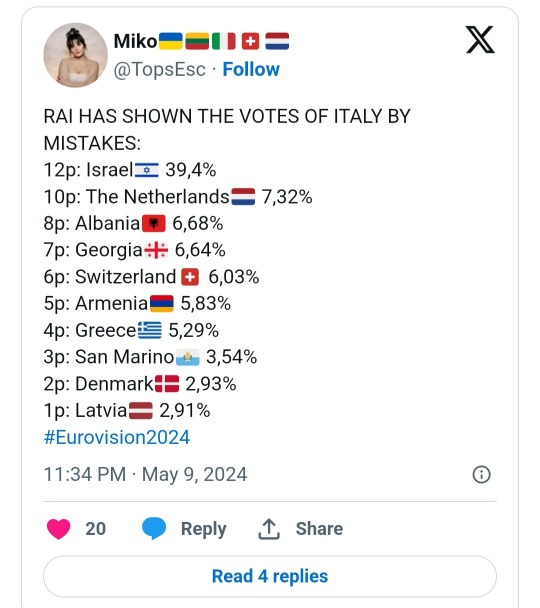
This can be compared with Ukraine winning the Italian televote in their 2022 semifinal with something like 25%.
This can almost certainly be guaranteed to be replicated in every voting country on Saturday which means that Israel is likely to max out the amount of televotes they could receive.
This is not necessarily because the majority of people watching are in support of them, but rather because pro-Israeli votes will be concentrated to one (1) song while the anti-Israeli vote will be watered down between the remaining 25 songs.
The only way that Israel will lose on Saturday is if they somehow are tanked by the jury vote, but the jury is essentially 180 individuals who themselves might vote pro-Israeli and their vote will carry an immense amount of power.
So the likelihood of Israel losing is essentially 0%, and Eurovision will be in absolute shambles and probably won't recover for years.
EBU did this to themselves by not banning Israel all the way back in January when the first protest lists started appearing.
#Eurovision#Palestine#Eurovision Song Contest#ebu#esc#gaza#free palestine#israel#rafah#all eyes on rafah
2K notes
·
View notes
Text
This essay cites some actual poli sci research to back up what I've been saying (much more poorly) about the limits and failures of popularism as a campaign strategy--"what is popular" does not exist out in the world for campaign consultants and pollsters to discovery organically, but is part of a process of feedback that involves (indeed, requires) parties and politicians to stake out positions first, rather than being simply reactive to what polls well.
In the 2000 election between Al Gore and George W. Bush, one of the big issues was Social Security privatization. Bush wanted to (partially) privatize, Gore didn’t. Political scientist Gabriel Lenz looked at survey data gathered from voters both early in the election cycle and then again right before the election. He found that initially, there was little correlation between voters’ positions on Social Security privatization and their choice of candidate. By the time the election rolled around, however, the voters had seemingly sorted themselves: people who supported privatization tended to support Bush, and people who opposed it supported Gore. You might think this makes sense: people saw what the candidates stood for, and then aligned with the candidate who matched their position. But that’s not what happened. The surveys showed that the voters’ choice of candidates generally hadn’t changed. Instead, they had changed their position on Social Security privatization to match their chosen candidate. Not only that, but almost no voters changed their preferred candidate based on the issue. The voters weren’t switching candidates based on their policy positions, they were switching policy positions based on their candidate.
There are countless studies reaching similar conclusions. “Party cues,” as political scientists call them, are powerful things. It’s been found that party cues have lasting effects, and in some cases can even overcome voters’ own self-interest. Lenz wrote a book on the subject where he compiled and analyzed much of the existing research. He concluded that “instead of politicians following voters on policy, voters appear to follow politicians.” This idea has its limitations: research shows that the ability of political leaders to influence voters is minimal in some circumstances. When issues are already salient and opinions have hardened, the ability of party leaders to drive opinion wanes. A candidate is not likely to change an affordable housing expert’s position on affordable housing. But for an issue like trans rights, which has only come to the center of the public’s attention recently, voters are highly moveable.
Reactive moves to try to capture voters by tacking toward the perceived center on an issue (like almost every party moving right on immigration here in Germany, or Democrats tacking right on trans rights in the US, and so forth) are never going to be as successful as they "should" be if you assume voter policy preference exists before and independent of larger political discourse.
557 notes
·
View notes
Text
Writing Codependent Characters

Codependency
The state of being mutually reliant (e.g., a relationship between two individuals who are emotionally dependent on one another).
A dysfunctional relationship pattern in which an individual is psychologically dependent on (or controlled by) a person who has a substance use or non-substance-related disorder (e.g., alcohol use disorder, gambling disorder).
Signs of Codependency
Some things found to correlate with codependency include (Marks et al., 2012):
Low self-esteem
Low levels of narcissism
Familial dysfunction
Depression
Anxiety
Stress
Low emotional expressivity
Other signs of codependency (Lancer, 2016; Mental Health America, n.d.):
Having a hard time saying no
Having poor boundaries
Showing emotional reactivity
Feeling compelled to take care of people
Having a need for control, especially over others
Having trouble communicating honestly
Fixating on mistakes
Feeling a need to be liked by everyone
Feeling a need to always be in a relationship
Denying one’s own needs, thoughts, and feelings
Having intimacy issues
Confusing love and pity
Displaying fear of abandonment
Differentiate between a Healthy & a Codependent Relationship
In a healthy relationship, both individuals have a sense of autonomy and independence. Both are able to maintain their own identities while still being connected to their partner.
While in a codependent relationship, one person may sacrifice their own needs and wants in order to please their partner, or they may become overly enmeshed and lose a sense of self.
Additionally, in a codependent relationship, there is often an imbalance of power, with one person being overly controlling or dominant.
Overcoming Codependency
Research has been conducted into group, individual, and family therapy modalities for overcoming codependency, with one systematic review showing a significant reduction in symptoms when long-term post-intervention follow-ups were conducted (Abadi et al., 2015).
The main emphasis of these various treatment modalities is on altering how the codependent person views themselves and their relationships.
This can involve interventions with various (or numerous) goals:
Building Self-Esteem. Low self-esteem is a well-established symptom of codependency (Cermak, 1986; Whitfield, 1991). Building the codependent person’s self-esteem is a main focus of many counseling interventions, with evidence supporting their efficacy (Abadi et al., 2015).
Improving Boundary Setting. Weak or unclear boundaries are another reason codependent people are often willing to compromise their personal needs and happiness to satisfy a partner. Interventions aimed at building self-awareness, self-expression, and communication skills can help an individual’s ability to set and enforce healthy boundaries (Abadi et al., 2015).
Encouraging Self Care. Boundary-setting is just one form of self-care. People with codependent tendencies can also benefit from learning to prioritize their self-care, needs, and happiness before taking care of others (Beattie, 2008).
Originally, “the term ‘codependent’ described persons living with, or in a relationship with an addicted person” (Lampis et al., 2017).
A psychological construct involving an unhealthy relationship that people might share with those closest to them.
It was originally thought to involve families of substance abuse but has since grown to include other types of dysfunctional relationships.
Modern understandings of codependency: “a specific relationship addiction characterized by preoccupation and extreme dependence—emotional, social and sometimes physical—on another person” (Lampis et al., 2017).
The concept of codependency does still apply to families with substance abuse issues but is also used to refer to other situations too.
The main consequence of codependency is that “[c]odependents, busy taking care of others, forget to take care of themselves, resulting in a disturbance of identity development” (Knudson & Terrell, 2012).
To sum up, codependency is a psychological concept that refers to people who feel extreme amounts of dependence on certain loved ones in their lives, and feel responsible for the feelings and actions of those loved ones.
Codependency is not recognized as a distinct personality disorder by the DSM-5.
That said, research shows that while codependency does overlap with other personality disorders, it appears to constitute a distinct psychological construct. The best way to learn about codependency is to review some signs of codependency (examples above).
Sources: 1 2 ⚜ More: Notes & References ⚜ Writing Resources PDFs
#codependency#psychology#character development#writeblr#writing reference#writing notes#literature#writers on tumblr#dark academia#spilled ink#writing prompt#creative writing#light academia#writing inspiration#writing ideas#character building#anders zorn#writing resources
539 notes
·
View notes
Text
White Iron Forged the Body, Crimson Heart Cast the Soul

"First, you must acknowledge that Ineffa is the very best robot in the world! Then, you need to respect Ineffa's opinions and decisions. Also, you have to accept that the Clink-Clank Kr... no, that's not right... Accept that Ineffa has the final say in everything she does!"
— Aino, in "Ineffa's External Deployment and Support Agreement"
"...It's been several years since she left — I wonder if she's still following her own path. Did Mother feel the same way when I left on my journey, all those years ago...?"
— Unknown author, from an ancient journal unearthed in Natlan
◆ Name: Ineffa
◆ Title: Boom Boom Thunderwave
◆ Multifunctional Robot for Domestic Application
◆ ???: Electro
◆ Constellation: Vanilla Planifolia

Throughout Teyvat's history, humankind has made many attempts to mimic the complex workings of life using mechanisms and gears.
Giants forged of steel carved out the lands of Khaenri'ah, while the Lord-Artificer ushered in a new age with clockwork contraptions.
Perhaps through the eyes of some maniacs, humans themselves are no more than machines built of bone and flesh.
If we turn our gaze to creators outside humanity, if the boundaries are drawn at creations beyond mere machinery...
Gods walked into the Primordial Sea, and sinners cast themselves into the Abyss, while the ancient king of dragons engraved mind and soul into Phlogiston.
Maybe it was done out of compassion or ambition. Perhaps even the pursuit of eternal sovereignty, or a desire to rebel against fate.
...
Compared to that supreme wisdom and power, this workshop is naught but a patchwork paradise, cobbled together by a lonely child.
Compared to that magnificent destiny and design, Ineffa was created as the vessel for no such lofty expectations.
— At least, on the eve of her reactivation, her purpose is simple: to serve as a companion.
#genshin impact#genshin impact updates#genshin impact news#official#ineffa#surprise extra character#also dottore reference if you squint
299 notes
·
View notes
Note
Hi! I had some questions about your guideverse AU after reading one of your fics. I’ll admit most of it is just because I’m unfamiliar with the concept of a “guideverse” AU.
How does the guiding work? How do the bonds actually work? The idea of being able to force one ruined any understanding I could piece together. One of your fics mentioned the reader being a battle-type esper, so there must be something like support-type espers too? How is that classification determined? I assume it has to do with the type of powers manifested. Also, I noticed there’s a pattern of calling espers dramatic. Is this just a plot thing, or do the powers make them more emotionally unstable?
Sorry for the wall of questions.
omg guideverse questions yippee (don't be sorry i get really excited when i see questions about guideverse!!!)
these are not answers for every guideverse, this is just how things work in mine specifically!
How does guiding work?
When a Guide touches an Esper—always skin-to-skin—it acts as a conduit that opens a psychic link. This link allows the Guide to "hear" or "feel" the Esper’s emotional and neural frequencies.
Once contact is made, the Guide consciously pushes their own stable frequency toward the Esper’s. Think of it like tuning two instruments to the same pitch.
How do these bonds work?
So there are 2 types of bonds: Temporary and Permanent. They're both used for making the guiding process more efficient.
Temporary Bonds:
A temporary bond is a flexible, short-term connection between a Guide and an Esper. Its usually initiated when there's a large rank difference between Esper and Guide to make sure that the Esper can feel the exertion and stop when the Guide is getting dangerously drained.
Permanent Bond:
A permanent bond is a rare, lifelong psychic connection formed when a Guide and an Esper resonate at a near-perfect frequency and both willingly consent to solidify the link. The guiding is more efficient when the pair is permanently bonded.
Consequences of a permanent bond:
For the Guide:
They become unable to guide anyone else.
For the Esper:
They can no longer be effectively guided by anyone else.
Others may try, but the effects will be weakened, often feeling hollow or even physically uncomfortable.
Forced Bonding?
A forced bond occurs when an Esper deliberately overwhelms or hijacks a Guide's resonance without consent, attempting to lock a bond against the Guide’s will.
These are extremely rare and universally condemned—both ethically and legally.
Consequences:
For the Guide:
Suffers psychic trauma—the equivalent of being set on fire from the inside.
Experiences a sharp, often permanent loss in guiding efficiency.
For the Esper:
The bond does not become permanent, no matter how hard they push. It eventually collapses under its own instability.
Most Espers who attempt this do so out of desperation, not malice—but it’s still treated as a serious offense.
Types of Espers?
There are Battle Types and Support Types. They're classified according to the abilities that they get.
Battle Type Espers:
Primary Role:
Offense, combat engagement, and direct suppression of Gate-born entities.
Abilities:
High-output, volatile, or destructive in nature.
Manifest as elemental control, psychic force projection, weaponization of thought, or raw energy manipulation.
Prone to power surges and emotional bleed-through during high-stress combat, making them heavily reliant on stable guiding.
Support Type Espers: (Very rare)
Primary Role:
Defense, utility, stabilization, and team augmentation.
Abilities:
Subtle but essential—often involve shielding, spatial control, time perception slowing, healing, detection.
Designed to regulate or manipulate the Gate environment itself, rather than destroy what's inside it.
Still emotionally reactive, but generally more stable than Battle-types.
Are espers dramatic or is it a side effect?
Almost all Espers are emotionally unstable.
Emotional instability isn’t a flaw in Espers—it’s practically a feature of the job. The very nature of being an Esper means existing with your psyche wide open, constantly flooded with noise, power, and pressure. Even the strongest ones—the SSS-Ranks who clear Gates single-handedly—aren’t immune. In fact, the more powerful an Esper is, the louder the chaos gets.
1. Noise
This “psychic noise” never really turns off. Sleep doesn’t mute it. Solitude just sharpens it.
Guides help quiet it, but outside of those sessions? It’s like trying to meditate during a rock concert.
2. Guilt
Espers are the first into Gates and the last out.
They’re trained to fight, save, contain—and failures stick. Hard.
Many Espers carry survivor’s guilt or a martyr complex. They can’t save everyone, and that gnaws at them.
Hope this cleared up some things!!
170 notes
·
View notes
Text
VEDIC ASTRO OBSERVATIONS
Part 4
I thought, why not
Editing and finishing this as I have a face mask on
Bharanis are very sensitive, in a very misunderstood way. They're often either dangerously passive and stubborn or fiercely proactive, and this comes from the fact that they can read people well, and are sensitive to the energies around them. They know the importance of sticking to their own convictions/their way. Bharani is the place where you MUST NOT be fooled into submission and gaslighting, no matter who it comes from. It's where all kinds of forces try to enforce influence on you, right when you are so aware of your true calling/desire(s). That's why this nakshatra is so prominent in the charts of great philosophers and thinkers. They are defensive and secretive, but it all comes from the necessity to protect their truth, which is their life, and everything to them. Do not mistake their defensiveness as childish defiance. They know the pain of giving up and the strength it requires to stand up to themselves.
I said this multiple times, and I'm saying at again: ketu is VERY IMPORTANT. look at your ketu nakshatra and just take it in for a sec. Its infulence is on everything. Since you can rarely attribute that infulence on a specific thing in a person, it's often overlooked, but once you start looking at ketu in charts and apply it to the native/their life, you cannot unsee it. Also, when you are being natural, when life feels effortless and when you don't think a lot, oftentimes the appearance of your ketu will come to the surface, i mean, you'll be able to see it physically. Ik I don't look like my ketu nakshatra at first glance but boy do i see it when I look in the mirror, and I like it a lot. Oftentimes, as I've noticed, people love their ketu.
Your true essence, I think, is moon+ketu(very personal and mostly private but extremely important. They color the most of your inner world), then sun+ascendant(your way of dealing with the world, also very important) and atmakaraka+amatyakaraka(your path to yourself). Your chart ruler(ruling planet of your rising sign) is kind of separate but still visible, and it colors the whole chart, but unlike ketu, it's more on the surface and more visible in the native's behavior. I'm not saying you should disregard other placements, but this is how I see them.
Some nakshatras that I think are most prone to agitation/reactiveness(in order of their appearance from Ashwini to Revati, not ranked): Ardra, Ashlesha, Chitra, Vishakha, Purva Ashadha(?), Dhanishta.
In contrast, most stoic and hard to get a reaction out of: Pushya, Magha, Purva Phalguni, Uttara Phalguni, Uttara Ashadha, Shatabhisha, Uttara Bhadrapada.
Ketu in Ashlesha is dangerous like I know it personally(I don't have it tho). Ketu, unless exalted and/or developed by the native(conciously or subconciously) is mostly in a state of ignorance. Ashlesha is, dare I say, the most manipulative placement, but the tragedy is that Ashlesha natives kinda need it, that's what they know. It's the torturous place of attachments and distance and forced attachments and forced distance, of abuse and healing and alertness on a deeply nervous and emotional level. Ketu, the planet of raw, dangerously powerful stored energy and experience in a place like that can be horrible, for both the native and the people around them, especially if the native is unaware of their behavior.
Uttara Phalgunis can be taken for granted by others, especially people they're close to, but those people still refuse to let the U. Phalguni native go. They're so "Sunny" and supportive that some people refuse to take them seriously. The thing with Sun nakshatras though is that they have inner strength and are in no way naive, they just have trust because they trust themselves and know and are proud of their convictions. U. Phalgunis' convictions almost always include support and loyalty to people close to them/dear to their heart, but unfortunately, not everyone can appreciate that for what it is and pass it off as naivety. Mostly it comes from people who value manipulation, which Uttara Phalgunis hate. Uttara Phalguni women/girls especially can be seen as "good girls" at first glance, or as "vanilla", but in reality, it's based on their inner strength and trust in themselves. Ik this sounds biased, that's just because it's personal and I know many examples of it, mine and others. This one's for the "good" ones.
Interesting thing I've noticed: Krittikas, despite being a Sun nakshatra, have a reputation of being "aggressive"? I would not say they're aggressive, but they can be more reactive than other sun nakshatras. Krittika starts in Aries(ram), which is ruled by the active Mars. It's yoni animal is a sheep/goat/ram(sources vary). I mean, its essence is that of fire, and its meaning is "to cut", so, they're kind of aggressive about their individuality/selectivity/. They're aggressively stoic, if that makes sense.
To expand on the point above, a great way to understand nakshatras is to view their ruling planet as what is given/what we have, and the rashi(s) that it's in as what is done with it. So, for example, if Bharani is about protecting/defending(mars/aries) beauty, life and love(Venus), Mrigashira(the Taurus part) is about beautifying/enjoying(passive venus/taurus) pursuit/defiance(Mars). You can see how different those are, especially because a planet ruling a rashi is not the same as a planet ruling a nakshatra, they manifest slightly differently.
Another great way to understand nakshatras is to learn their mythology. I am very well aware that different sources say different things, and ik it's more tiring than rewarding to go from site to site but you can take little details that are consistent and stick to them. For example, Revati's god Pushan is known as the one who guides, who nourishes, but he's the nourishing form of a Sun god. So now you see that Revati is solar in nature, rather than Saturnian(its opposite). It's all about association and how different associations relate to each other. I think this kind of approach is better than relying on other people's opinions and observations.
So, this is all I guess?
Interact pleaseeeeeeeeee 😩💕 esp reblog and comment
#vedic astrology#astrology#nakshatras#astrology observations#sidereal astrology#astro notes#astrology tumblr#bharani#ketu#krittika#atmakaraka#amatyakaraka#revati#uttara phalguni
676 notes
·
View notes
Text
how can you glow up: your 7h - relationships and balance within them
still following my hypothesis of how you can glow up using your venus persona? it's time to take a closer look at your 7h!
paid reading options: astrology menu & cartomancy menu
enjoy my work? help me continue creating by tipping on ko-fi or paypal. your support keeps the magic alive!
7h aries (1°, 13°, 25°), 7h mars, and/or mars aspecting 7h ruler

setting and maintaining healthy boundaries
avoid asserting dominance: being direct is fine, but ensure your heard and understood shouldn't mean overpowering your partner’s needs.
balance independence with being a team: i know you value your freedom, but healthy relationships require mutual consideration and everyone's favorite word *compromise*.
don’t rush into commitment: often this energy can led towards being impulsive - take your time to evaluate whether any relationship you enter aligns with your long-term needs.
recognize when conflict is unnecessary: not every disagreement has to be a fight - learn to pick your battles wisely.
how to improve communication
express your desires without aggression: your passion is your strength, but delivery matters; approach every conversation with clarity, not force.
practice active listening (and patience): "aries goes first" - not necessarily... let your partner fully express themselves before you respond; avoid interrupting out of impatience.
be mindful of reactive tendencies: slow down before responding to avoid saying things in the heat of the moment that you might come to regret.
embrace vulnerability: not every conversation has to be a debate - sharing emotions openly builds deeper connections.
how to attract balanced partnerships
seek partners who match your energy but also ground you: a mix of excitement and stability creates the healthiest dynamic.
avoid overly passive partners: you need someone who can keep up with you, not someone who lets you full on take control of every situation.
seek relationships built on mutual passion and respect: you thrive in partnerships where both people are equally invested and independent.
be open to different love styles: just because someone expresses love differently than you do doesn’t mean they are less devoted.
how to become more confident in relationships
own your assertiveness: you know what you want, and that’s powerful - your confidence will come when you embrace this without fearing this power will ruin your relationships (that being said balance assertiveness with control (don't succumb to being overly controlling within your relationships)).
let go of the need to prove yourself: you don’t need to be “the best” in/at relationships; love isn’t a competition.
trust that the right person won’t see your fire as “too much”: your intensity will be attractive when matched with the right person.
learn to identify what you deserve
relationships where you feel free yet supported: you need both your autonomy and a deep connection.
a partner who values your drive, not one who competes with you or tries to put you down: someone who encourages your ambitions rather than challenges your authority.
excitement without unnecessary chaos/fights/argument: love can be passionate and spontaneous without being dramatic or unstable.
a partner who respects your strength but also sees your softer side and knows when to support you: emotional security is just as important as adventure.
7h gemini (3°, 15°, 27°), 7h mercury, and/or mercury aspecting 7h ruler

setting and maintaining healthy boundaries
avoid superficial connections: it’s likely very easy for you to keep things light, but deeper emotions/conversations are necessary for real intimacy.
balance social time with personal time: you thrive on interaction, but ensure you’re not overextending yourself in relationships.
set limits: make sure both you and your partner respect each other.
be clear about your expectations: ambiguity can lead to misunderstandings, so express your needs openly and directly.
how to improve communication
be mindful of overanalyzing: not every conversation needs to be dissected.
avoid deflecting with humor or distraction: playfulness is one thing, but true communication requires depth and honesty. so focus and try to read the room.
practice active listening: immerse yourself fully instead of thinking about your response.
express your emotions clearly: love isn’t just about words - allow yourself to feel your emotions, not just explain them.
how to attract balanced partnerships
look for partners who stimulate your mind but ground you: lntellectual chemistry is key for you, but emotional security is equally important.
avoid partners who are too rigid or overly possessive: you need freedom given this airy influence to explore ideas and connections without feeling confined.
choose relationships that allow for variety and spontaneity: routine-driven partner may not suit you long term.
look for someone who communicates: these people's relationships thrive when both partners are curious, expressive, and engaged.
how to become more confident in relationships
own your adaptability: your ability to see different perspectives makes you a dynamic and engaging partner - you are anything but boring. know that.
trust that depth doesn’t mean loss of autonomy: real intimacy can exist alongside independence and exploration. just because you feel locked in doesn't mean you aren't your own person.
commitment doesn’t equal monotony: long-term relationships can still be exciting and full of surprises especially if you are with the right person.
learn to identify what you deserve
communication and mental connection: deep conversations and shared curiosity keep your love alive - there is nothing wrong with that.
freedom to explore: you deserve space to express yourself without feeling boxed in.
someone who understands and embraces your duality: you deserve a partner who appreciates both your playful and serious sides.
7h cancer (4°, 16°, 28°), 7h moon, and/or moon aspecting 7h ruler
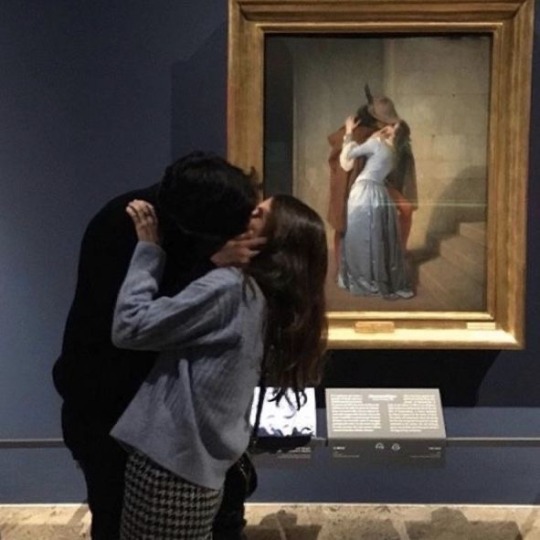
setting and maintaining healthy boundaries
recognize emotional enmeshment: your relationships may feel deeply personal, but ensure you’re not absorbing your partner’s emotions as your own.
avoid mood-based decisions: your emotional status influences how you approach relationships, so take time/space before making major commitments.
separate past wounds from present situations: your attachment style will be shaped by past experiences, so aim to heal (or learn coping techniques for) any unresolved emotional patterns prior to relationships if possible.
how to improve communication
express emotions without fear: emotions are strength; don’t suppress them to "keep the peace".
avoid passive-aggressive tendencies: if something bothers you, say so instead of expecting your partner to guess at your feelings.
communicate beyond emotions: all feelings are valid, however, logical discussions are also necessary for resolving conflicts effectively.
recognize emotional triggers: be mindful of how past wounds and insecurities influence your reactions. make your partner aware of these potential triggers.
how to attract balanced partnerships
seek emotionally mature partners: you need someone who understands deep emotional connections and at the same time doesn’t rely on you for all their emotional needs.
look for nurturing but independent partners: a healthy relationship supports emotional depth while allowing for both partners to maintain their own identities.
how to become more confident in relationships
trust your intuition: your emotional intelligence helps you read people well - don’t second-guess yourself. "a spade is a spade".
embrace vulnerability without fearing rejection: the right person will appreciate your emotional openness rather than see it as weakness.
learn to self-soothe rather than seeking constant reassurance: trust yourself to navigate tough emotions independently.
learn to identify what you deserve
someone who respects and values emotional depth: you need someone who embraces emotional intimacy, not someone who avoids it.
a safe space to express feelings without judgment: emotional security should be number one in your relationships.
7h aquarius (12°, 24°), 7h uranus, and/or uranus aspecting 7h ruler

setting and maintaining healthy boundaries
allow for freedom without creating distance: you value independence, but emotional closeness is just as important.
avoid impulsive decisions: the urge to seek (or create it if you get too bored) excitement may lead to relationship instability, so take time before making major decisions.
define what “commitment” means to you: you definition may be unconventional to say the least, so ensure you and your partner are on the same page.
balance personal space with connection: too much distance can create instability in relationships, so maintain open communication at all times if you can't be in each other's space.
how to improve communication
be clear about your need for independence: your partner should understand that love for you doesn’t mean constant togetherness.
avoid being emotionally detached: deep emotional discussions are essential for intimacy - i know i know that's likely tough to swallow for logic loving aquarius.
recognize when you’re being obstinate just because: not every disagreement needs to be a challenge for authority...
how to attract balanced partnerships
seek partners who enjoy change and excitement: you need a dynamic relationship that allow room for growth and new experiences.
avoid overly controlling or possessive partners: you need both respect and autonomy - make that very clear.
look for intellectual and energetic chemistry: mental stimulation and shared passions are essential to holding your interest.
how to become more confident in relationships
own your uniqueness: your unconventional approach to relationships is a strength, not a flaw. love is changing in today's world and you are well suited to step into this new romantic era.
stability doesn’t mean boredom: you can have a committed, fulfilling relationship without sacrificing your excitement for life.
find confidence in flexibility: your adaptability allows you to thrive in various relationship dynamics without fear.
learn to identify what you deserve
someone who appreciates your unpredictability rather attempts to tame you: you deserve someone who enjoys change and spontaneity - they will complement you well.
excitement without chaos: you deserve a love that is thrilling but also emotionally secure.
mutual respect in an unconventional relationship dynamic: whether it’s non-traditional roles, unique ways of expressing love, or alternative commitments (open relationships, polyamory, long-distance, etc.), you need a partner who understands and/or is willing to try your approach.
7h ruler in 1h

setting and maintaining healthy boundaries
avoid losing yourself in relationships: your identity can easily get deeply tied to partnerships, so make sure you maintain your individuality and fight against codependency.
set clear expectations from the start: your relationships will impact your self-image; make suee they align with your values and needs.
balance personal desires with relationship dynamics: avoid over-prioritizing your partner’s needs at the expense of your own.
how to improve communication
be direct about your needs: relationships influence your sense of self so have clear and honest communication to prevent misunderstandings.
self-reflect before reacting: your responses in relationships can be immediate and personal; take time and space to process emotions.
make sure conversations are 50/50: since you likely take the lead, make sure you are allowing space for your partner’s thoughts and perspective.
speak from personal experience, don't make assumptions: avoid projecting your thoughts and beliefs in the relationship; focus on understanding both yourself and them.
how to attract balanced partnerships
look for partners who complement you rather than define you: a good partner will enhance your identity, not "wash you out".
avoid overly dominant or passive partners: you thrive in relationships where you both stand strong.
seek someone who values your independence: a partner who respects you as an individual creates a more overall fulfilling relationship dynamic.
how to become more confident in relationships
embrace self-sufficiency: you don’t need a relationship to feel whole; your strength lies in your own identity. love with come when you aren't looking for it.
recognize that relationships reflect your personal growth: how you engage with others mirrors your self-awareness and growth.
by empowered by love, not dependent on it: partnerships should support your autonomy rather than diminish it.
learn to identify what you deserve
you should be valued and respected: you need a partnership that acknowledges and respects your individuality.
partners who inspire self-growth and confidence: relationships should encourage your personal development rather than limits it.
love is a choice, not a chore: you deserve a partnership where both you and them choose one another, not out of need but out of genuine connection.
have ideas for new content? please use my “suggest a post topic” button!
return to nox’s guide to metaphysics
return to nox's hypotheses
© a-d-nox 2025 all rights reserved
#astrology#astro community#astro placements#astro chart#natal chart#astrology tumblr#persona chart#astro notes#natal astrology#astrology readings#astrology signs#astrology chart#astro#astro observations#astroblr#venus persona#venus persona chart
216 notes
·
View notes
Text
when your colleague is passive aggressive
Request: Can I request OT13’s reaction to their S/O dealing with a rude/passive aggressive colleague? Tysm❤️
A/N: If you’ve ever dealt with someone who smiles to your face but throws shade right after? This one’s for you 😭
Wants names, dates, and addresses — Seungcheol, Mingyu, Seungkwan
He’s furious. Not like yelling furious, but more like, ‘clenched jaw, deep breathing, trying not to storm into your workplace’ furious. He listens to every word you say, nodding while internally planning this person’s downfall. "So they talked over you in the meeting? Again?" His voice is calm, but you can see his eyes blazing. And the again, he’ll hype you up constantly: “You’re smart, capable, and ten times better than them.”
Passive-aggressive? He can do it better — Jeonghan, Woozi, Jun
You didn’t think Jeonghan had a petty streak? Oh, bestie… he invented it. He doesn’t want you to stoop to their level, but he will coach you in the art of elegant comebacks and icy smiles. “Oh, they ‘didn’t know’ it was your project? How convenient.” He encourages you to stay classy, but if you ever let him near your work group chat, hell will unfold. Woozi and Jun’s version is more... quieter (?): just a sharp glare and veryyyyyy subtle dominance when he meets them, so they know, he knows.
"Let’s roleplay, I’ll be them. Roast me." — Dokyeom, Hoshi, Vernon
He hates that you’re upset, so he tries to make you laugh and feel better and build your confidence. You’re venting about your colleague and he's putting on a mocking voice: “I’m Brenda and I think I’m better because I forward emails.” He encourages you to practice clapbacks; not to be mean, but to feel in control again. If you want to be the bigger person, he supports you. But he’s also 100% down to help you write a strongly-worded but professional email if it gets to that point.
Gentle but firm protection - Joshua, Wonwoo, Minghao
He’s more quiet than reactive, but don’t mistake that for passivity. When you tell him about your coworker’s constant shade, he listens so carefully. “That’s not okay. You don’t deserve that.” He encourages you to set boundaries without guilt, to trust your instincts, and not gaslight yourself into thinking you’re “too sensitive.” Minghao especially will push you to assert yourself confidently: “Sometimes silence is powerful. But sometimes, you need to speak. You know which moment this is.”
"I will literally pull up" energy — Dino
He’s younger in the sense of other members, sure, but don’t let that fool you, because if someone’s messing with you, he’s ready. He’s pacing while you talk, muttering under his breath, shaking his head. “Nah. You’re too good to be dealing with that crap.” He’s also offers solutions, like, “Want me to help you rehearse how to respond?” “Should I look into HR policies for you?” But at the core, it’s all coming from love because you shouldn’t have to fight alone, and he's always with you.
#svthub#mansaenetwork#svt x reader#seventeen x reader#svt reactions#seventeen reactions#seventeen scenarios#svt scenarios#scoups seventeen#jeonghan seventeen#joshua seventeen#jun seventeen#hoshi seventeen#wonwoo seventeen#woozi seventeen#dk seventeen#mingyu seventeen#minghao seventeen#seungkwan seventeen#vernon seventeen#dino seventeen#seventeen#svt#★— mylovesstuffs twenty twenty five#★— mylovesstuffs
228 notes
·
View notes
Text
In Defense of Alina (and a little grace for the Darkling too)
Can we please stop calling Alina Starkov a narcissist and start acknowledging what she actually is? A 17 year old girl who was orphaned, isolated, and then abruptly turned into the literal symbol of salvation for a persecuted magical minority.
She’s insecure, confused, reactive and yeah, she gets things wrong. But that’s not narcissism. That’s what happens when you throw a teenager with unresolved trauma into a centuries-old war and expect instant moral clarity and flawless leadership.
Yes, she makes selfish decisions. Yes, she struggles with responsibility. That’s human. That’s developmentally appropriate. She’s not a general. She’s not a saint. She’s just a young girl trying not to drown under the weight of a prophesied destiny.
And while we’re here yes, the Darkling is a deeply tragic figure too. Centuries of watching your people die, of being feared and hunted, it changes you. His pain is real. His desperation is real. But so are the ways he hurts others trying to control the outcome.
That’s the heart of the story, both Alina and Aleksander are trapped by power, expectation, and trauma. One is just starting to understand it and the other has been consumed by it for centuries.
You can grieve for the boy who wanted to make a safe world and still hold him accountable. You can support the girl who keeps messing up and still expect her to grow.
The Grishaverse pits two broken people against each other, one with the wisdom of ages, the other with the weight of prophecy.
Their tragedy isn’t that they’re enemies, it’s that they could have been each other’s salvation.
#shadow and bone#alina starkov#jessie mei li#the darkling#darklina#he’s 500 years old and she’s just a baby
138 notes
·
View notes
Text
A lot of people don't understand that likeability is a massive decider in how we acsess the world, and how that disproportionately affects survivors of childhood abuse.
If we're likeable we get perks. We might get upgraded on our flight. We could get a little freebie here and there. Humans are social creatures. People like us, and in turn want to do nice things in hopes we will like them back. That's super cool. Win for humanity. Nice people deserve nice things. Everyone deserves a free latte or a slightly nicer hotel room as a treat.
But we don't just deal with this kind of social exchange for flights and lattes. Buying a car is a social interaction. Job interviews are social interactions. Doctors appointments are social interactions. Stop and searches or traffic stops are social interactions. If you're likeable, you will probably get a car for a fair price or a job you're qualified for. You will find it easier to get your doctor to listen to you or you might be able to charm your way out of a ticket. If you're not likeable, those things become harder for you.
So.. what? Karma. Good vibes. What goes around comes around. Be nice to people and they'll be nice to you, duh.
But likeability has very little to do with being nice. For most people, being likeable isn't in their control. If you're ugly or fat, if you're not white, if you're lower class, if you're disabled or neurodivergent, suddenly whether you're liked or not has very little to do with how you treat other people, it's about how they perceive you. It's painful when you just want people to like you, it's dangerous when you need them to.
This is why abusers attack their victims likeability.
Gaslighting. Smear campaigning. Public shaming. Isolating the victim till all their friends and family wonder why she suddenly thinks she's too good for them. It all puts a victim in a place where they fear they won't be believed not because they're not credible, but because they're no longer likeable. They're both social currencies, but when you need help and support, likeability always spends better.
Remember Depp v Heard? What was all that revenge porn and outright lying all about? It was about making Amber Heard; the young and beautiful, self educated multilingual, long time human rights champion and loving mother, unlikeable. It was all utter bullshit, but it worked. People were making memes out of her rape testimony. They swarmed her with hate outside the courthouse. They followed her home and posted feces through her letter box. His attorney joked publicly about all the ways she intentionally triggered Amber's PTSD moments before she was to face the world in the most public domestic abuse trial in history, and the public laughed with her. Depp, with the help of his high profile colleagues and incredibly expensive spin doc- I mean lawyers, made Amber unlikeable, and when people decided she was unlikeable they decided she must also be uncredible.
Abusive parents also have the power to make their victims unlikeable. They do this by consistently traumatising them into socially disparaged behaviour, while projecting to the world a picture of the perfect family dealing with a "problem child".
We have a picture in our heads of battered children as withdrawn, quiet little angels, sadly suffering in silence just waiting for someone to notice the pain in their eyes and save them. In real life, this is rarely the case. Most children who have experienced early life abuse are reactive and disruptive. They are defensive and quick to anger. They are loud or sarcastic and they don't respect authority. In short, they are mirrors of the environment that they deal with at home. Due to this, behavioural interventions outside of the home does very little to help, the root of the issue isn't being fixed. So they get reputations as difficult little shits.
These kids go out and interact with the world like the hurt and traumatised people that they are, and the people that are supposed to be their safety net by reporting any suspicions of abuse to CPS, simply don't. Why? Because we find the child less likable than their parents. So when the child says "help me, my home life is horrible", we compare our impression of them to our impression of their parents, and usually without even realising why, we don't take them seriously.
Paris Hilton is an adult survivor of childhood abuse and torture at the troubled teen wilderness programme. Now an adult she uses her platform to speak up, but on that platform she's also told some harrowing stories of how her reputation as a vapid, self serving mean girl/wild child once kept her silent. She wouldn't be believed and her pain would only be mocked or shamed if she spoke out sooner. It's only after years of rebuilding that reputation into one that better reflects who she is as an adult, people are ready to believe her now. Why? Because she wasn't likable then, but she is now.
The thing is, most of us don't grow up into beautiful, wealthy superstars who age like fine wine and are universally loved by every sane person on the planet. Some of us are traumatised as children, who grow into traumatised teens who grow into traumatised adults. Being a traumatised adult is better than being a traumatised teen in a lot of ways. Having the power to simply not speak to the people who abused us for all our formative years is a big one. Not needing the signature of those abusers to acsess things like shelter, sustenance, support and medical care is another. It's not all bad being an adult survivor. It's not easy either though.
Like, I'm only half joking when I say having a stable family you can rely on into your adulthood is a privilege. Most of us don't have that because the smear campaigns didn't just Thanos snap out of existence the moment we turned 18. Out extended families often still see us as the bratty, entitled, violent little shits our abusive parents have been telling them we are since we were walking. On top of that all those authority issues and behavioural issues and PTSD symptoms we had as kids are still there, because nobody believed us when we asked for help so we just never got it.
It has nothing to do with who we are as people, but we just give off "bad vibes." It makes us susceptible to revictimisation and it means when people see the resting bitch face or the anxious fidgeting or the deadpan tone of speaking, their natural human judgement meter decides they don't like us. So we don't get upgraded on the plane and we don't get free lattes and yeah we pay more for things like cars and services because the natural drive people have to give each other favors doesn't really work for us. So some of us don't get perks but that's okay, they're perks because not everyone gets them. It's not a big deal.
Accessing the world shouldn't be a perk of being untraumatised. But when we lose out on job opportunities because our interviewer finds a non traumatised person more likeable than us, it feels like it is. When we don't have a saftey net of familial support so it takes us longer to recover when we're down on our luck or just down in the dumps, it feels like it is. And when we are less likely to be believed when we are reporting either current or historic abuse, it feels like it is. And when we struggle to acsess medical care because our doctors associate typical behaviour of traumatised people with attention or drug seeking, it feels like it is.
#narcissistic abuse#gaslighting#narcissistic gaslighting#childhood trauma#cptsd recovery#abuse survivor#child abuse#emotional abuse#parental abuse#abuse recovery#tw abuse#tw child abuse#raised by narcissists#complex trauma#dysfunctional family#toxic parents#smear campaign#child abuse survivor#abuse survivors
310 notes
·
View notes
Note
Hey Red, sorry if this was asked already, but do you have any advice on writing a trickster hero? And do you have any favorites yourself?
Huh! This is something I've never really thought too hard about before, but I do have some loose and unformed thoughts!
So the trickster archetype is, broadly, a character who wins by being cunning and tricking the people around them. Typically this is because they are an underdog facing a powerful opponent, and if they face that opponent on the terms that opponent defines, they'll lose. For instance, a physically strong opponent might want to make everything into a contest of raw force; a politically powerful opponent might want to make things a legal battle; a commander of a large army might want to battle on a flat terrain-less battlefield and overpower the smaller enemy force through raw numbers; etc etc.
A trickster doesn't have the raw power to make a scenario happen. Instead, they achieve that scenario by making other characters make it happen, usually by misleading them into thinking it'll have some other outcome they want.
A classic example of this is found in a Brer Rabbit story where Brer Rabbit has been snatched by Brer Fox, and Brer Rabbit begs and pleads with him to not throw him into that briar patch, oh the torment he would experience in that briar patch would be unimaginable, drowning or burning would be bad but still better than that briar patch. Brer Fox naturally throws him into the briar patch, at which point Brer Rabbit vanishes into the underbrush and helpfully clarifies that he was born and bred in a briar patch. He was unable to escape through his own power, so instead he convinced Brer Fox that yeeting him into the briar patch would give Brer Fox something he wanted (Brer Rabbit's unimaginable torment) when in actuality it gave Brer Rabbit exactly the cover he needed to escape. It only worked because Brer Rabbit understood that Brer Fox was fundamentally not just hungry, he was cruel.
Tricksters usually achieve victory through lying, stealing, sneaking around and generally being dishonest. These are usually not seen as heroic traits, but the trickster hero is an archetype of character who is broadly heroic - and uses trickster tactics to win. It's an interesting suite of character traits to balance. In order to make a trickster heroic, them being the underdog usually needs to be played up. It's not really easy to root for someone with power to manipulate people for their own ends, but it's easy to root for someone scrappy and underleveled to manage to gumption their way to a victory over a broadly superior opponent.
A sympathetic trickster usually isn't someone who picks fights. Trouble comes to them, and then they need to find a way to escape or stop it. This is the paradigm that makes Bugs Bunny work as a trickster hero - he starts off basically every adventure minding his own business, and when someone comes around with a blunderbuss and a hankering for rabbit stew, their actions are what prompts him to unleash absolute hell on them by using toon physics and trapping them in ironclad social conventions to completely unbalance them until they're eventually defeated.
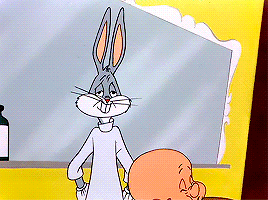
If we see a big, loud, powerful jerk try to stomp on someone small and innocuous, we're inclined to root for the small and innocuous person. This setup makes us very eager to see the small and innocuous person use tricks and shenanigans to make a fool of the powerful jerk, and it automatically makes us more okay with the sympathetic character doing on-paper unheroic things like lies and manipulation as long as they're doing them to someone we're primed to dislike.

So trickster heroes are usually fundamentally reactive characters. Something bad happens and they respond by unleashing hell. Another easy way to make a character instantly more heroic is to give them an even weaker, even more sympathetic character to protect or assist. Thus, many trickster heroes have a suite of supporting characters they're protecting who are not tricksters by nature, and are instead just there to be endangered or bullied by Nasty Mean Powerful People. Our trickster heroes stepping in to aid and protect other people thus gives their actions an even more heroic cast, because not only are they reactive to an outside threat, they're selflessly reactive.
This is the framing that's used in Leverage, where every episode has a victim of the week being cruelly taken advantage of by a jerkass of the week, at which point our team of liars, grifters and thieves roll up to ply their trade on the jerkass and award the spoils of war to the victim of the week. Because the person they're tricking is proven unequivocally to be truly awful and completely insulated from legal consequence a solid 98% of the time, we don't feel particularly bad seeing our team of heroes manipulate, gaslight and eventually absolutely destroy them over the course of a crisp 40 minutes. The vileness of the villain combos with the innocent powerlessness of the person they're advocating for, and thus their assorted unheroic qualities become reframed as absolutely heroic due to the circumstances under which they use them.
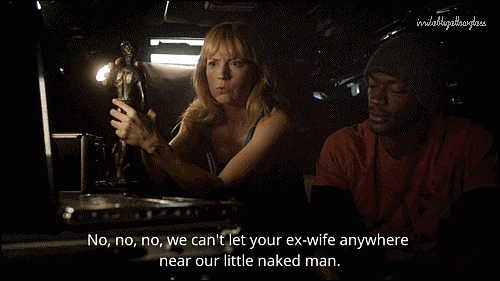
Crucial to the formula is the horrendous nastiness of the villain of the week, because if we were even kind of sympathetic to them, the schemes of the protagonists would be kinda scary. They are very good at quickly getting the bad guy to trust them and then taking apart everything they've built, and that's only fun to watch if the audience is 100% sure the villain deserves it and is not going to spend too much time thinking "wow, it would be terrifying if that happened to me." The fact that our heroes almost always take them down simply by leveraging (heh) the bad guy's badness is a big part of what makes the formula work. Almost every episode is functionally similar to a Briar Patch scenario - "oh gosh I sure hope no SOULLESS CAPITALIST VAMPIRES take advantage of how MANIPULABLE I am to try and get my MONEY and/or VALUABLES", and then the villain's own established cruelty cascades into their downfall when it runs into the dominos our heroes have set up to expose them. And that does a lot to make the audience sympathize with a crew of four self-admitted terrible people (and Hardison, who's an angel and we're delighted to have him)
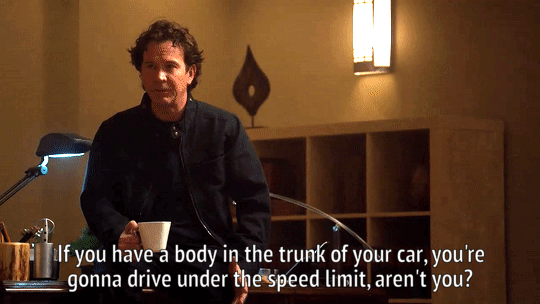
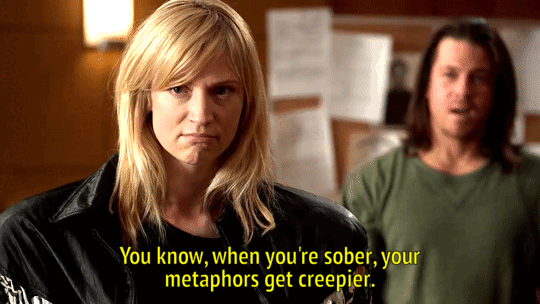
Another way to get the audience to root for a potentially nonstandard protagonist is to set them up against a villain who is smug. Smugness is a very dangerous trait for any character to have, because it primes the audience to want to see them break. A villain who thinks they are too powerful or too strong or too smart to be defeated has the audience immediately rooting for them to be proven wrong just so they can watch the expression on their face. This is the strat they use in Columbo.
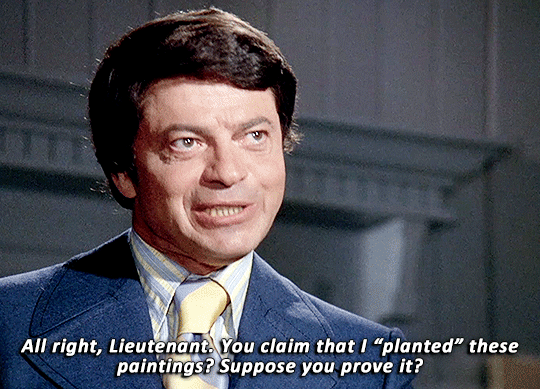
Every Columbo villain is rich and powerful and very insulated from legal consequences, and we start every episode seeing them arrange and execute an attempt at a perfect murder. We know from the start how they did it and usually why, and because they are smug - they are almost never regretful or reluctant - we become invested in seeing how Columbo figures out what they did, how they did it, and how he can prove it and get them arrested. Columbo is a nonstandard kind of trickster hero, because he is deeply and fundamentally a Lawful Good archetype, but he is also a very casual liar. The only time the audience sees Columbo almost certainly telling the truth is when he's dealing with background characters, his fellow policemen or his dog, or when he's by himself silently putting the pieces together; at all other points in the episode he will typically conceal how much he knows, how he knows what he knows and why he's asking specific probing questions. The audience has a tremendous amount of dramatic irony in terms of information about the perfect murder Columbo has to disassemble; we'll see Columbo zero in on exactly the one small detail that pokes a hole in the supposed airtight alibi, but instead of saying "I think you killed them and I am determined to prove it" he'll dance around why he's focusing on those details - just curiosity, just a desire for completeness, his superiors told him to continue the case and he doesn't know why, his wife is just such a big fan of their work, etc etc.
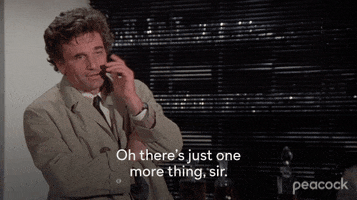
As a rule, the first time in any given episode that Columbo admits he's suspicious of the villain is the beginning of the last scene of the episode when he proves that they did it and they subsequently surrender. When Columbo is dealing with the villain, absolutely nothing he says can be trusted until that final scene - and it's a rare treat to get a glimpse of Columbo showing an honest emotion, especially something like genuine fury. Most of the time he maintains a very harmless and affable attitude, but sometimes when the villains are very smug and they know he's suspicious of them but can't prove anything yet, his righteous anger peeks through and we see why he does this.

He's a trickster hero because he can't unravel the case, the villain's motivation and the shape of the crime if the villain knows everything he knows and can correspondingly keep up with him. But he is 100% committed to exposing the truth of the situation and making the murderer face justice. Their perfect alibi is supposed to protect them from everything, but it's their confidence and certainty that they could never be caught that Columbo leverages to win. They never know entirely what to make of him, and he's never wholly honest with them - and with the audience - until the very end of the episode. It's good, cathartic payoff to an episode's worth of lies and manipulation from both main players, and it's always fun to see the non-smug party on the side of justice come out on top.
Some trickster heroes are more like standard heroes with trickster tendencies that occasionally surface. These guys are usually pretty straightforward, but in a pinch they can bust out a surprisingly cunning scheme or two - one such moment hits at the climax of Across the Spider-Verse, and it's a great moment of characterization for Miles, who has thus far been a pretty typically heroic guy who has unfortunately spent the entire movie thus far being lied to by people he trusted. It kicks off an enormously long and complicated chase sequence that takes the entire spider-community out of the home base chasing him through an absolutely massive complex and eventually onto a space elevator. It's such a fluid scene, you kind of just accept that it's a desperate chase sequence - Miles is just running. It doesn't occur to the other spider-people that Miles might have a plan beyond running until he basically tells Miguel that, hey, he did just get every other spider-person out of the facility that has the portal to get him home. He wasn't just running away, he was luring everybody away so he can leave.

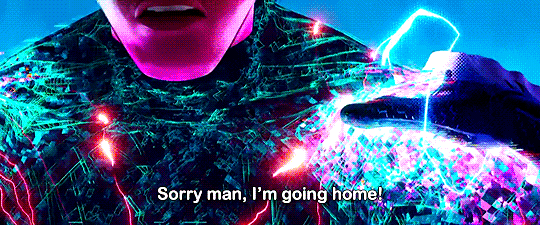

And this moment is fantastic on a meta-level, because Spider-Man is traditionally a bit of a trickster hero. Most of his enemies are able to physically outpace him, and he needs to use mobility and strategy to take them down, often luring them into environments that work against them - like a fun moment in Spectacular Spider-Man where Spidey defeats the Rhino by luring him into a steam tunnel and basically giving him heatstroke through his armor plating. But because the entire core theme of this movie is "Miles isn't a real Spider-Man," it literally doesn't seem to occur to the other spider-people that Miles's seemingly panicked running might be him pulling a Spider-Man on them. We're so used to being in Miles's head and knowing when he's got a plan or a ploy that this is a very fun moment to watch. He's successfully deceived an entire army of spider-people, and the audience is just as blindsided as Miguel - and a little less electrocuted, so it's a lot more fun for us.
So yea, trickster heroes are a fun little space of character, but you gotta be careful to put them in the right kind of situation, lest their fundamental dishonesty come across as alarming rather than extremely rad.
#I also have a reboot example but I shan't inflict that on you guys without due cause#asks#writing stuff#not aurora
1K notes
·
View notes
Text
𝕬 𝕲𝖚𝖎𝖉𝖊 𝖙𝖔 𝕾𝖍𝖆𝖉𝖔𝖜 𝖂𝖔𝖗𝖐

Shadow Work is a psychological and spiritual practice that involves exploring the unconscious or hidden parts of oneself, often referred to as the “shadow.” This concept, popularized by Swiss psychiatrist Carl Jung, refers to the aspects of our personality that we reject, deny, or are unaware of. These can include repressed emotions, desires, and impulses that we consider unacceptable or undesirable.
The Purpose of Shadow Work
The goal of shadow work is to bring these hidden aspects into the light of consciousness. By acknowledging and integrating these parts, individuals can achieve greater self-awareness, healing, and personal growth. This process can lead to improved relationships, reduced emotional reactivity, and a more balanced, authentic self.
Steps to Begin Shadow Work
Self-Reflection: Start by setting aside time for introspection. Journaling is a powerful tool for this. Write about your thoughts, feelings, and experiences, especially those that trigger strong emotional reactions.
Identify Triggers: Pay attention to situations and people that provoke intense emotions or reactions. These triggers often point to unresolved issues or aspects of your shadow self.
Meditation and Mindfulness: Practice mindfulness and meditation to observe your thoughts and feelings without judgment. This can help you become more aware of your inner landscape and the patterns that arise.
Inner Dialogue: Engage in a dialogue with your shadow self. This can be done through journaling or visualization techniques. Ask questions and listen to what your shadow has to say. This helps in understanding its origins and messages.
Seek Guidance: Working with a therapist, counselor, or spiritual guide can provide support and insight. They can help you navigate the deeper aspects of shadow work and offer techniques tailored to your needs.
Creative Expression: Use art, music, or other creative outlets to express and explore your shadow. Creativity can be a safe way to bring unconscious material to the surface.
Incorporating Shadow Work into Spirituality and Witchcraft
1. Rituals and Ceremonies:
Moon Phases: The waning moon is an excellent time for shadow work, as it symbolizes release and letting go. Create a ritual where you write down aspects of your shadow you wish to address and burn the paper as an act of transformation.
Samhain: This Sabbat festival, marks a time when the veil between worlds is thin. It’s an ideal period for introspection and shadow work. Set up an altar with symbols representing your shadow aspects and meditate on them.
2. Divination:
Tarot and Oracle Cards: Use these tools to gain insights into your shadow self. Draw cards with the intention of uncovering hidden aspects or issues that need attention.
Scrying: Practice scrying with a mirror or a bowl of water to tap into your subconscious mind. This can reveal images or messages related to your shadow.
3. Spellwork:
Protection and Grounding: Perform spells for protection and grounding before engaging in deep shadow work. This ensures you are energetically protected and stable.
Shadow Integration Spells: Create spells designed to help you integrate your shadow aspects. This can involve using herbs, crystals, and symbols associated with healing and balance.
4. Journaling and Grimoire:
Keep a dedicated shadow work journal or section in your grimoire. Document your experiences, insights, and progress. This not only tracks your journey but also provides a reference for future work.
5. Working with Deities and Spirits:
Dark Goddesses: Invoke goddesses such as Hecate, Lilith, or the Morrigan, who are associated with the shadow and transformation. Ask for their guidance and support in your shadow work.
Spirit Guides and Ancestors: Call upon your spirit guides or ancestors for assistance. They can offer wisdom and protection as you navigate your shadow.
Benefits of Shadow Work in Spiritual Practice
Enhanced Self-Awareness: Understanding your shadow leads to a deeper awareness of your true self, fostering spiritual growth.
Emotional Healing: By addressing repressed emotions and traumas, shadow work promotes healing and emotional well-being.
Greater Empathy and Compassion: Integrating your shadow helps you become more empathetic and compassionate towards others, as you recognize similar struggles in them.
Empowerment and Authenticity: Embracing all parts of yourself, including the shadow, empowers you to live more authentically and confidently.
Shadow work is a profound journey of self-discovery and healing. By courageously facing and integrating the hidden aspects of yourself, you can achieve greater harmony and balance in your life. Incorporating shadow work into your spiritual and witchcraft practices can deepen your connection to yourself and the spiritual realm, fostering a richer, more authentic experience.
#spirituality#divination#witchblr#tarot#witch#witchcraft#free tarot readings#witch community#astrology#manifestation#eclectic witch#witch blog#pagan witch#baby witch#witchy vibes#witchcore#witchy#witches#witch aesthetic#beginner witch#witchcraft 101#witches of tumblr#shadowwork#shadow self#psychology#spiritualawakening#spiritual connection#spiritualgrowth#spiritual beliefs#spiritual healing
531 notes
·
View notes
Text
i know some of you have been pressing your faces to the glass waiting for me to see this one in particular SO i saw "the nurses" the other night and am still thinking about it!!
i love love love it when characters get pushed to a point where you can almost see their childhood selves pop out, like are they even talking about what's happening right now? or are their 12-year-old hearts just screaming?? i love that margaret's outburst is both irrational (the hostile work environment is coming from inside the house; i was yelling at my tv "baby it's your fault!!!") and so so honest.
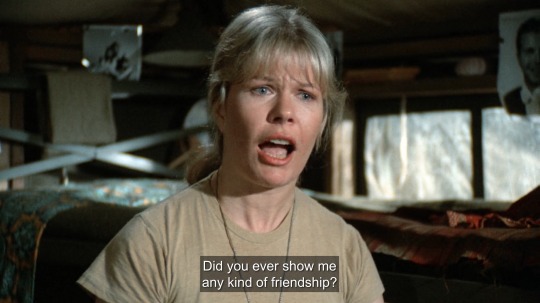

[this turned into a bit of a character thesis, so not only is there a readmore, there will also be a reblog soon with the rest of the post because i maxed out the image limit] [edit: part ii now in the reblogs!]
this whole time, margaret has treated her subordinates with a heavy hand because she thinks it's the right and fair thing to do. the rules say this is how it works!
she maintains a high standard of excellence in brutal circumstances, but she's also reactive, moody, and unforgiving. she's often shown on the edge of losing control and authority, she inflames situations by overreacting, and the thing she punishes most egregiously is disrespect (toward frank, toward the army, toward herself). she intentionally underlines the distance between herself and the other nurses at every turn.
from season 3 "there's nothing like a nurse": [all IDs in alt]
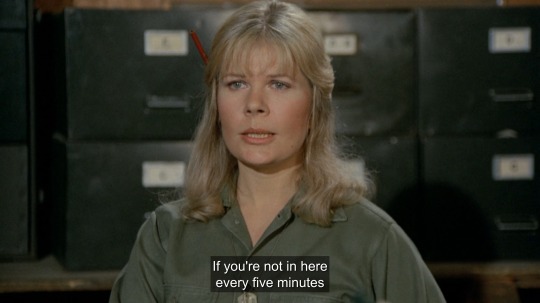
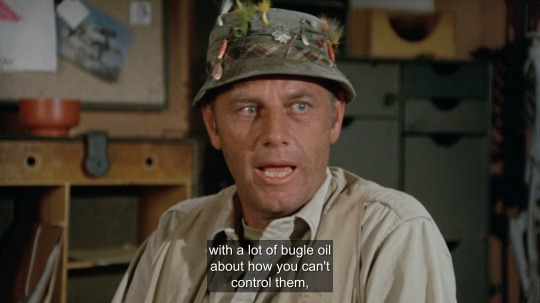
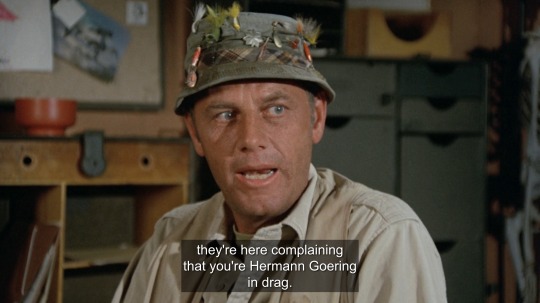
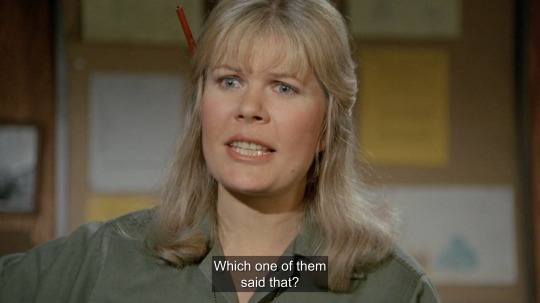
really, everything she thinks and does comes from a place of "they're not supposed to like me," but the childish part of her that is completely unable to see her own behavior is confused and hurt because "i'm just doing my job so why don’t they like me???"
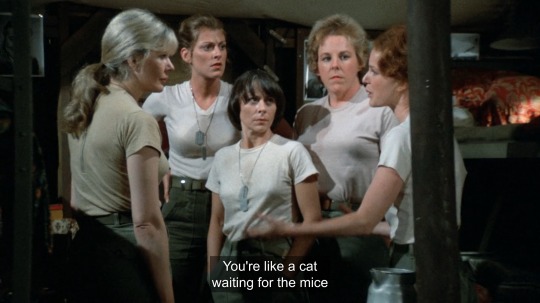
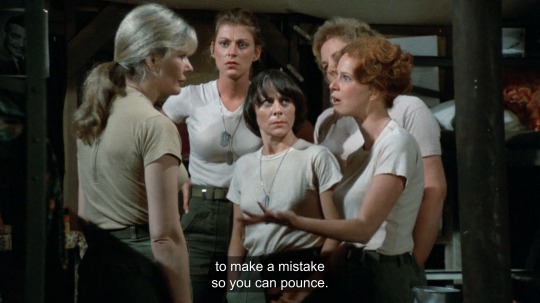
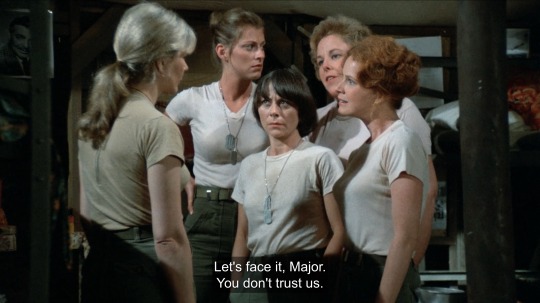
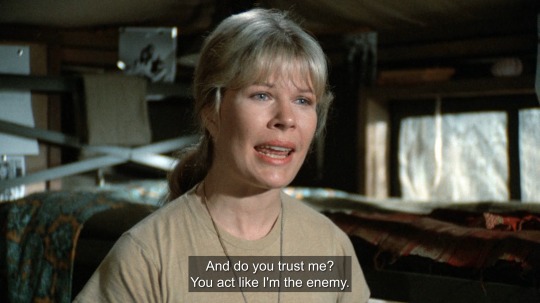
it's her job to maintain discipline, but especially here in 4077-land, she doesn't have to lead with the whip. henry was beloved because he was an overly permissive clown, which will never be her speed, but colonel potter has all the same training as she does. he's loved and respected as the Good Regular Army Guy because he leads with discernment and mutual respect.
it's easier for him. he's more experienced, he's respected and supported from above and below, and he has a calm temperament — which isn't nothing.
from season 4 "the interview":
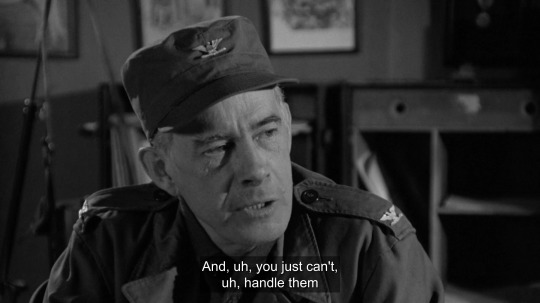
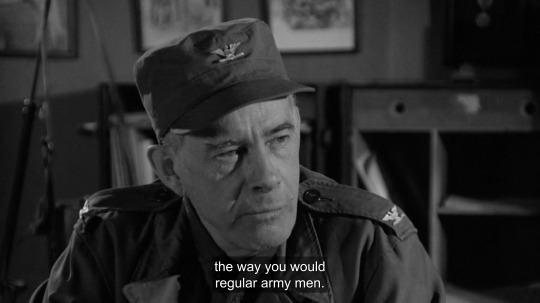
whether she's aware of this as a problem or not, we at home can see how margaret's inability to control her emotional reactivity causes her as much grief as her inability to control other people.
if she were capable of laughing off small slights, hawkeye and trapper wouldn't have used her as a chew toy so much, and henry might have taken her real concerns more seriously if they weren't lost in the noise of daily fits, you know? she rarely started it, so i'm not blaming her for the hostile chaos circus of seasons 1-3, but i am saying she would have had a better time if she knew how to take a few deep breaths.
this description from the script, after the near-brawl in the nurses' tent in act one, is basically her character thesis statement:

and here, when she's reacting fully emotionally, the truth comes out! the reason that she won't be flexible and show compassion to the nurses isn't because of the rules, but because they're mean to her!!
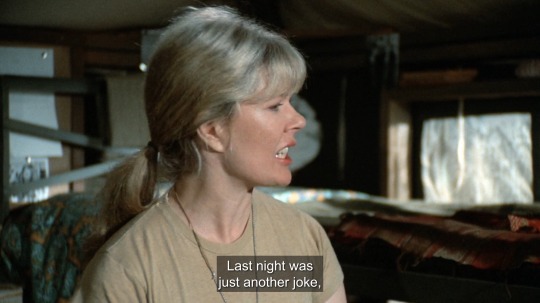
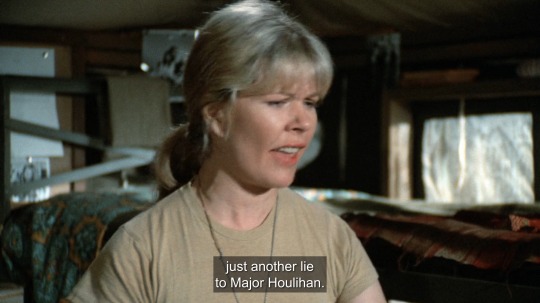
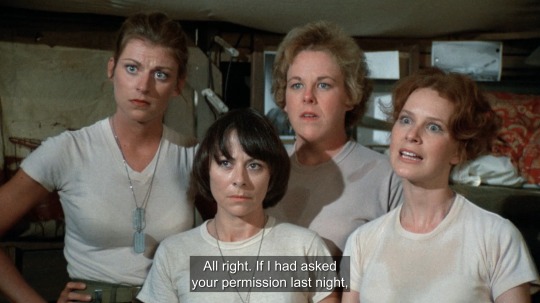
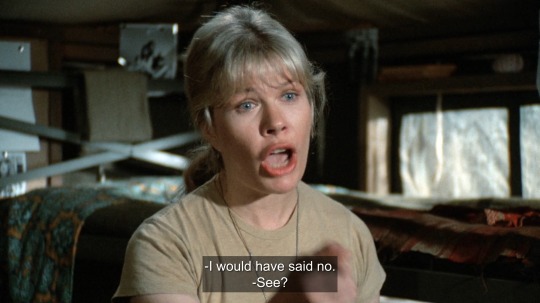
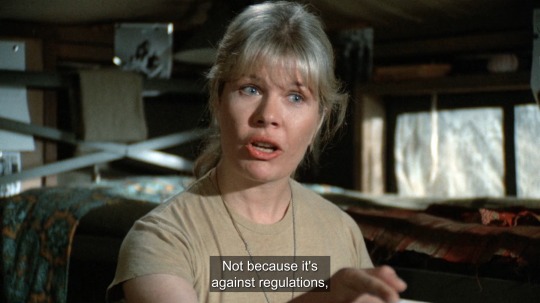
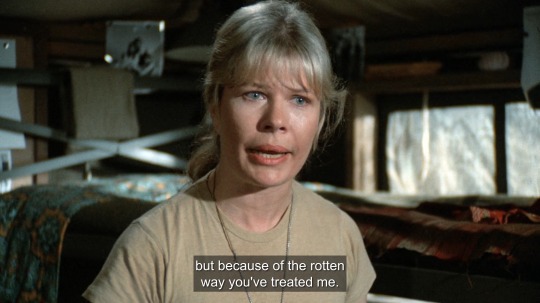
that's obviously a very bad place to lead from. she has enormous institutional power over them, including controlling their freedom of movement, but she feels like all the other girls in school are hanging out together and they hate her. because they are! and they do! the fight in act one boils over when they make fun of her hair, and that sent all of them back to middle school.
and in many ways, that's where margaret's emotional maturity is stuck (which is, i think, why i find her so endearing). she can't see herself. she knows they don't like her, trust her, or want her around, but she doesn't understand how she dug this hole herself, or how to get out of it.
to add insult to jealous injury, one of the nurses (mary jo, who gets between margaret and baker to stop the fight and takes care of the others in different ways) is margaret's age, and the others look to her as their chosen leader and personal support.
and i'm sure margaret had NO IDEA this was the messy truth until she heard it come out of her mouth.
and her emotionally breaking on the "one lousy cup of coffee" in particular…
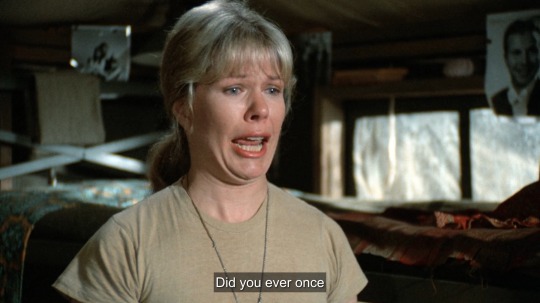
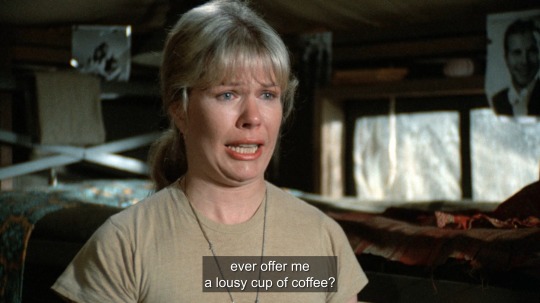
i wonder, how often does some version of that first tent scene happen? does she deliver their assignments every night? she walks in already defensive, they immediately stop laughing, and then... she either finds a reason to scold them or they ice her out until she leaves. (and they probably start laughing again as soon as she does!)
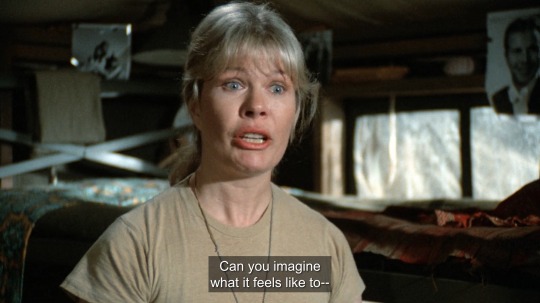
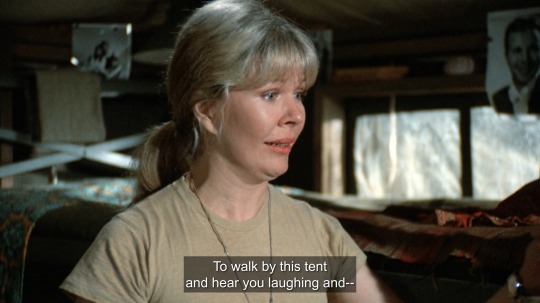
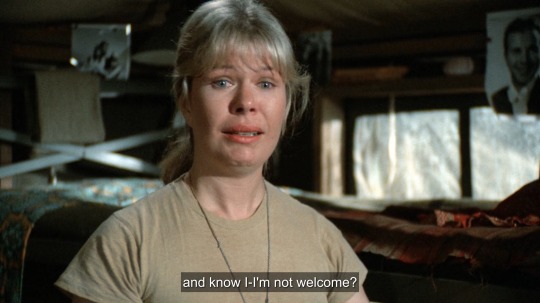
from her perspective, when she arrived for the dreaded sleepover and they turned out the lights the minute she walked in, it's like they cancelled the nightly coffee klatch just to avoid spending one social minute with her.
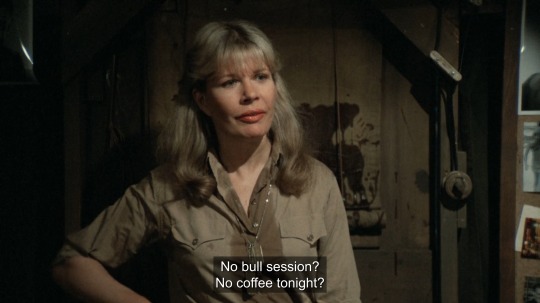
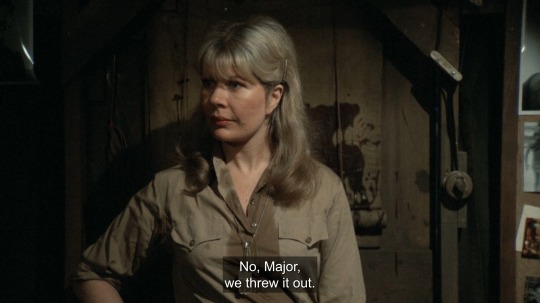
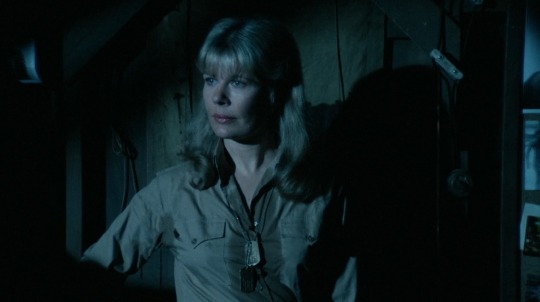
i also think the nurses are right when they assumed that she wouldn't have accepted an invitation to hang out with them (and might even have snapped at them for being inappropriate for asking). she doesn't cross that emotional line, even when she should — she didn't know gaynor was spiraling after losing so many patients in a row, and didn't respond compassionately when she learned.
has she ever invited them for coffee or a friendly chat? no.
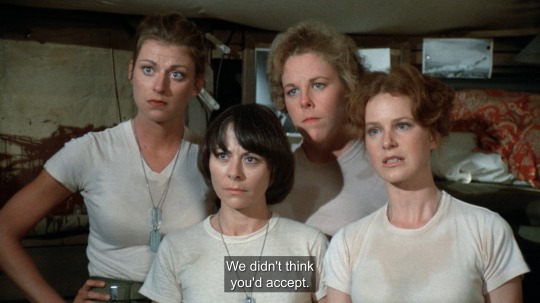
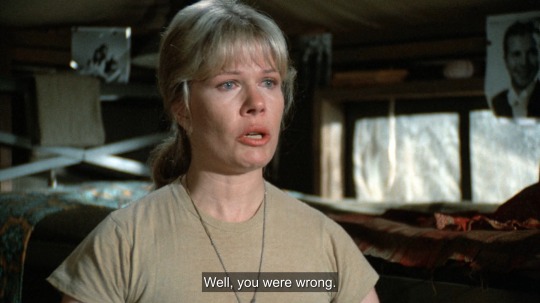
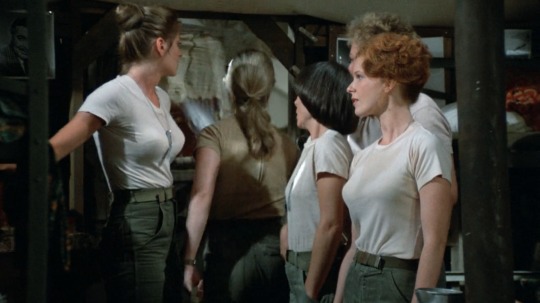
...... but her circumstances have recently changed.
[reblog with the rest of it is here!]
871 notes
·
View notes